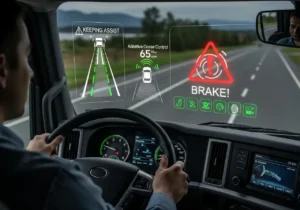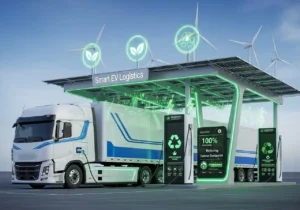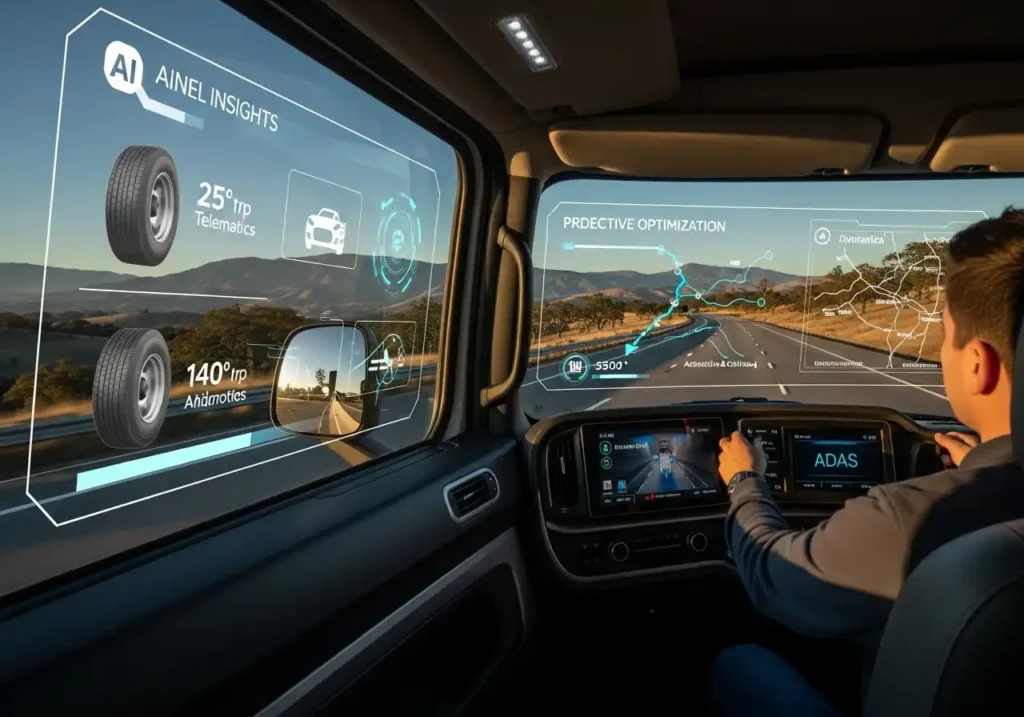The trucking industry is undergoing a major transformation as technology continues to evolve. In 2025, innovations like AI-powered fleet management, advanced driver assistance systems (ADAS), and telematics are becoming central to improving efficiency and safety. These technologies are making it easier for trucking companies to manage their fleets, reduce costs, and enhance road safety. Let’s dive into the advancements that are shaping the future of trucking.
Key Technological Developments in Trucking
AI-Powered Fleet Management
AI is revolutionizing fleet management in the trucking industry. Using real-time data from trucks, AI systems optimize routes, monitor driver behavior, and predict vehicle maintenance needs. This technology enables fleet managers to make data-driven decisions, resulting in better route planning, fewer delays, and enhanced operational efficiency. AI can also help trucking companies forecast demand and adjust schedules accordingly, ensuring that goods are delivered on time without unnecessary delays.
Advanced Driver Assistance Systems (ADAS)
ADAS technologies are becoming standard in modern trucks, and their benefits go beyond just improving driver comfort. Features such as automatic emergency braking, lane-keeping assist, adaptive cruise control, and collision warnings help drivers navigate complex road situations with ease. These systems reduce human error, which is a leading cause of accidents in the trucking industry. ADAS improves overall safety and helps prevent accidents, particularly in challenging driving conditions like bad weather or heavy traffic.
Telematics and Vehicle Tracking
Telematics has emerged as an essential tool in modern trucking operations. By integrating GPS technology and data analytics, telematics allows fleet managers to track vehicles in real-time, monitor fuel consumption, and assess driver performance. It also helps with regulatory compliance, as fleet operators can easily log hours of service and ensure that drivers are following legal guidelines. Moreover, telematics can help optimize routes, leading to more efficient deliveries and lower operational costs.
How These Technologies Are Benefiting the Trucking Industry
Improved Safety
 One of the most significant benefits of modern trucking technologies is improved safety. ADAS systems, like lane departure warning and automatic braking, help prevent accidents by alerting drivers to potential hazards. With AI-powered fleet management, fleets can monitor driver performance in real-time, ensuring that drivers are following best safety practices. These systems are particularly useful in preventing collisions, reducing fatalities, and ensuring safer travel for truck drivers and other road users.
One of the most significant benefits of modern trucking technologies is improved safety. ADAS systems, like lane departure warning and automatic braking, help prevent accidents by alerting drivers to potential hazards. With AI-powered fleet management, fleets can monitor driver performance in real-time, ensuring that drivers are following best safety practices. These systems are particularly useful in preventing collisions, reducing fatalities, and ensuring safer travel for truck drivers and other road users.
Enhanced Efficiency
Efficiency is at the heart of the trucking industry. With AI, telematics, and route optimization software, trucking companies can ensure their fleets are running as efficiently as possible. AI-powered algorithms can calculate the best routes, reducing fuel consumption and travel time. Telematics also enables fleet managers to monitor vehicle performance, proactively addressing maintenance issues before they cause costly breakdowns. The result is a more efficient operation that minimizes downtime and maximizes fleet productivity.
Cost Savings
Trucking companies are always looking for ways to cut costs, and technology plays a pivotal role in helping them do so. By improving route planning, reducing fuel consumption, and proactively maintaining vehicles, these technologies lower operational costs. AI and telematics enable fleet managers to identify inefficiencies, such as underperforming drivers or routes that cause unnecessary delays. Furthermore, predictive maintenance reduces the likelihood of costly repairs and unplanned downtime, contributing to long-term cost savings for trucking companies.
Environmental Impact
 Environmental sustainability is becoming an increasingly important goal in the trucking industry. Electric trucks and hybrid vehicles are gaining popularity as alternatives to traditional diesel-powered trucks. These vehicles produce fewer emissions, helping trucking companies meet environmental regulations and reduce their carbon footprint. Telematics also contributes to sustainability by optimizing fuel consumption, ensuring trucks are running at their most efficient. As more companies adopt sustainable practices and invest in cleaner technologies, the trucking industry is moving towards a greener future.
Environmental sustainability is becoming an increasingly important goal in the trucking industry. Electric trucks and hybrid vehicles are gaining popularity as alternatives to traditional diesel-powered trucks. These vehicles produce fewer emissions, helping trucking companies meet environmental regulations and reduce their carbon footprint. Telematics also contributes to sustainability by optimizing fuel consumption, ensuring trucks are running at their most efficient. As more companies adopt sustainable practices and invest in cleaner technologies, the trucking industry is moving towards a greener future.
The Future of Trucking Technology
Looking ahead, the future of trucking technology appears even more promising. The rise of autonomous trucks is expected to be a game-changer. Self-driving trucks will be able to operate around the clock, significantly reducing transportation costs. However, challenges related to regulations, public perception, and infrastructure still need to be addressed before autonomous trucks become mainstream. Despite these challenges, the continued development of AI, machine learning, and other technologies will undoubtedly drive the industry forward.
As the trucking industry moves into 2025 and beyond, embracing technology will be key to staying competitive. Companies that adopt these innovations early on will likely benefit from enhanced operational efficiency, better safety records, and a more sustainable future. Whether it’s through improved fleet management systems or the integration of autonomous vehicles, technology is undoubtedly shaping the future of trucking.
Conclusion
Trucking technology in 2025 is transforming the way the industry operates, boosting both efficiency and safety. From AI-powered fleet management systems to advanced driver assistance technologies, these innovations are helping trucking companies streamline their operations, cut costs, and reduce the risk of accidents. As technology continues to evolve, the future of trucking looks brighter than ever, with smarter, safer, and more sustainable practices becoming the norm.

